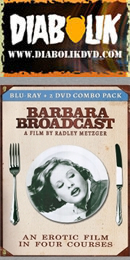
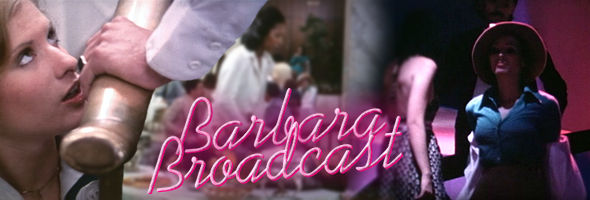
Color, 1977, 82m.
Directed by Henry Paris (Radley Metzger)
Starring Annette Haven, C.J. Laing, Susan McBain, Jamie Gillis, Constance Money, Wade Nichols, Alan Marlow, Sharon Mitchell, Bobby Astyr, Shirley Peters, Michael Gaunt
Distribpix (Blu-ray & DVD) (US R0 HD/NTSC) / WS (1.85:1) (16:9), VCA (US R0 NTSC)
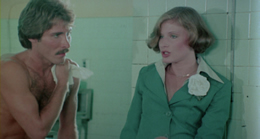
Having established himself as a successful adult film director under the name Henry Paris, Radley 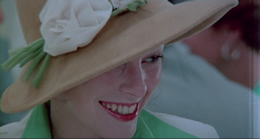 Metzger quickly followed up his groundbreaking The Opening of Misty Beethoven one year later with this palette cleanser, a virtually plotless sex comedy far removed from the protracted, elaborate production of that earlier classic. Drawing inspiration from the airplane sex menu scenes in Misty, this entire film revolves more or less around the sublime, surrealist idea of a high class New York restaurant where the patrons and staff integrate no-strings sex into their dining courses.
Metzger quickly followed up his groundbreaking The Opening of Misty Beethoven one year later with this palette cleanser, a virtually plotless sex comedy far removed from the protracted, elaborate production of that earlier classic. Drawing inspiration from the airplane sex menu scenes in Misty, this entire film revolves more or less around the sublime, surrealist idea of a high class New York restaurant where the patrons and staff integrate no-strings sex into their dining courses.
That's where we first meet renowned sex expert Barbara Broadcast (Haven), a famous sex worker turned writer probably modeled on Xaviera "The Happy Hooker" Hollander, where she's being interviewed by adventurous reporter Roberta (Laing). People don't just eat food here, as the staff delivers a variety of services straight off the menu (and the punishment for breaking dishes is pretty unforgettable). Barbara's interview is constantly disrupted by autograph requests, carnal favors, and visits from old friends, while the clientele dallies on the tables and enjoys unorthodox salad dressing. Eventually Roberta decides to get in on the action by traipsing off to the kitchen where she enjoys a steamy session with a cook (Nichols) in one of adult cinema's most legendary sequences. Later that night she and Barbara meet up again at a disco, where they engage in some public displays with the libidinous Curley (Gillis) and listen to his story involving a disciplinarian approach to a Protestant American Princess (Misty herself, Constance Money).
The opening half hour-plus of Barbara Broadcast is a 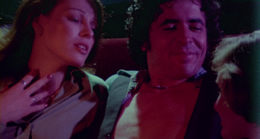 delirious delight and one of the indisputable highlights of the five Paris films, with the elegant restaurant setting provides a perfectly Bunuelian backdrop for a variety of sexual activities. After that it's more like a string of stag loops barely held together by Haven and Laing, but that still keeps well within classic territory -- and for those who judge their adult classics by heat rather than coherence, this one ranks near the top. The kitchen sequence is by far the most intense moment of the film, and all of the performers (particularly Laing, an impish cross between Jennifer Grey and a young Barbra Streisand) seem to be putting their all into their roles. As usual, the soundtrack comprised of library tracks is impeccably chosen (including one choice that will probably surprise viewers of TV's The People's Court), and the atmosphere is wonderfully achieved with lots of bustling activity within the frame in most scenes and a mixture of elegant and swanky decor.
delirious delight and one of the indisputable highlights of the five Paris films, with the elegant restaurant setting provides a perfectly Bunuelian backdrop for a variety of sexual activities. After that it's more like a string of stag loops barely held together by Haven and Laing, but that still keeps well within classic territory -- and for those who judge their adult classics by heat rather than coherence, this one ranks near the top. The kitchen sequence is by far the most intense moment of the film, and all of the performers (particularly Laing, an impish cross between Jennifer Grey and a young Barbra Streisand) seem to be putting their all into their roles. As usual, the soundtrack comprised of library tracks is impeccably chosen (including one choice that will probably surprise viewers of TV's The People's Court), and the atmosphere is wonderfully achieved with lots of bustling activity within the frame in most scenes and a mixture of elegant and swanky decor. 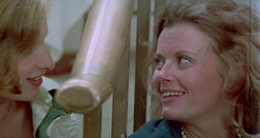
While most of the Henry Paris films underwent significant censorship on home video, Barbara Broadcast was damaged the most extensively and, prior to the Distribpix Blu-ray/DVD special edition, seemed plagued to always suffer cuts on home video. While The Private Afternoons of Pamela Mann comes in a close second by losing an entire sequence in a car garage involving Jamie Gillis, Barbara Broadcast first turned up on VHS from VCA running a scant 69 minutes, dropping almost the entire final seven minutes of the film (again featuring Gillis). In fact this chilly S&M sequence was an excised scene from Misty, which provoked Money into a lawsuit for additional payment. Also drastically shortened was the kitchen scene, with Laing's lengthy and startling impromptu use of a kitchen pan to relieve herself relegated to some fleeting off screen sound effects. The VCA DVD reinstated some of the footage from the finale (but still omitted all of the explicit shots, still making it pretty senseless), but the kitchen scene remained drastically compromised. On a positive note, that disc contains an audio commentary 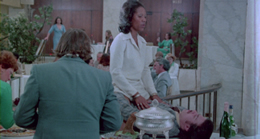 track with Gillis and Gloria Leonard, returning to duty from their chat track on the first Misty DVD, but their specific recollections are rather limited due to the fact that Leonard had nothing to do with the film and Gillis merely had a glorified cameo. Instead they offer more of an overview of the whole '70s adult film scene, Metzger's filmmaking techniques, and the histories behind the various performers.
track with Gillis and Gloria Leonard, returning to duty from their chat track on the first Misty DVD, but their specific recollections are rather limited due to the fact that Leonard had nothing to do with the film and Gillis merely had a glorified cameo. Instead they offer more of an overview of the whole '70s adult film scene, Metzger's filmmaking techniques, and the histories behind the various performers.
As with their previous Henry Paris titles in addition to the superlative Misty, the 2013 combo release of Barbara Broadcast from Distribpix is a real joy for fans who have been waiting for decades to get this uncut and in decent condition on home video. The fact that it's on Blu-ray just makes the deal even sweeter, and as with the other titles, the 2K HD transfer looks great with far more detail and natural skin tones compared to the faded, misframed, and heavily edited prior editions. This time another shocker is the drastically improved sound, which is much more clear and delectably rich than ever before (thanks to the survival of the original mag tracks). The one unavoidable flaw is a kind of slight light flare on the right side of the frame in some shots due to a lab error; it's always been there, and thankfully the decision was made to just leave the film intact rather than reframing it selectively or just zooming the whole thing in. It's barely noticeable in motion and not really a bothersome factor at all.
As for extras, the platters served up here rival Misty in their breadth as each of the 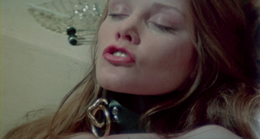 three discs contains something exclusive. The Blu-ray houses the 82-minute "hard version" of the film in its fully uncut version, along with another solid audio commentary with Metzger and moderator Benson Hurst. There's a lot of preliminary groundwork laid for the first several minutes but once they get to the film at hand it's a quick, breezy chat track. Of course, the most interesting story is how they managed to find that restaurant location in the first place; it's a funny saga you'll have to hear firsthand (and the building in which it was shot still stands in the Big Apple). The usual intensive trivia subtitle track is here and spectacularly good as always, pointing out details involving the cast (right down to the bit players) and singling out each music cue. There's also a thumbnail sketch of the film's censorship history staggered through there, too. In addition to the DTS-HD Master Audio 2.0 mono track, you also get optional subtitles in English, French, Spanish, German, Italian, German, and Portuguese. (So now you can learn how to say "When you're old enough not to ask" in six other languages.) Also included are the (long and pretty daring) theatrical trailer, an extensive gallery of stills and poster art (including some great candid shots from the restaurant shoot), and radio spots.
three discs contains something exclusive. The Blu-ray houses the 82-minute "hard version" of the film in its fully uncut version, along with another solid audio commentary with Metzger and moderator Benson Hurst. There's a lot of preliminary groundwork laid for the first several minutes but once they get to the film at hand it's a quick, breezy chat track. Of course, the most interesting story is how they managed to find that restaurant location in the first place; it's a funny saga you'll have to hear firsthand (and the building in which it was shot still stands in the Big Apple). The usual intensive trivia subtitle track is here and spectacularly good as always, pointing out details involving the cast (right down to the bit players) and singling out each music cue. There's also a thumbnail sketch of the film's censorship history staggered through there, too. In addition to the DTS-HD Master Audio 2.0 mono track, you also get optional subtitles in English, French, Spanish, German, Italian, German, and Portuguese. (So now you can learn how to say "When you're old enough not to ask" in six other languages.) Also included are the (long and pretty daring) theatrical trailer, an extensive gallery of stills and poster art (including some great candid shots from the restaurant shoot), and radio spots.
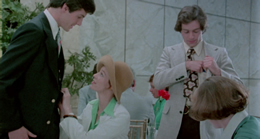 The second disc, a DVD, contains the hard version in standard def, the commentary, and two additional featurettes. The first is a 15-minute making of that uses production photos, film clips, and other assorted material to run through the history of the film, its place in the Henry Paris continuum, and the backgrounds of its major players (including the singularly wild story of Wade Nichols, who bounced between straight and gay porn, cut a disco album for Casablanca Records, recorded a TV theme song, and had a regular role on the soap opera Edge of Night before his untimely death). Then there's a half-hour video interview with industry regular Michael Datorre, a.k.a. Michael Gaunt, who shares the business office scene in this film with Haven and also appeared in Misty (as the French sailor client near the beginning) and such other titles as Let Me Die a Woman, Blowdry, and even a quick but memorable role in Lucio Fulci's City of the Living Dead (as the smut-reading gravedigger). He covers his start coming of age in New York, his stunned reaction on seeing himself on the big screen for the first time, working with Metzger so early in his career, and the Shakespearean basis of his porn name. It's a fun interview all around, wrapping up in the last ten minutes with a sort of video commentary in which he watches and reacts to his scene in this film (mostly some mild dirty talk, but he obviously remains a big fan of Haven).
The second disc, a DVD, contains the hard version in standard def, the commentary, and two additional featurettes. The first is a 15-minute making of that uses production photos, film clips, and other assorted material to run through the history of the film, its place in the Henry Paris continuum, and the backgrounds of its major players (including the singularly wild story of Wade Nichols, who bounced between straight and gay porn, cut a disco album for Casablanca Records, recorded a TV theme song, and had a regular role on the soap opera Edge of Night before his untimely death). Then there's a half-hour video interview with industry regular Michael Datorre, a.k.a. Michael Gaunt, who shares the business office scene in this film with Haven and also appeared in Misty (as the French sailor client near the beginning) and such other titles as Let Me Die a Woman, Blowdry, and even a quick but memorable role in Lucio Fulci's City of the Living Dead (as the smut-reading gravedigger). He covers his start coming of age in New York, his stunned reaction on seeing himself on the big screen for the first time, working with Metzger so early in his career, and the Shakespearean basis of his porn name. It's a fun interview all around, wrapping up in the last ten minutes with a sort of video commentary in which he watches and reacts to his scene in this film (mostly some mild dirty talk, but he obviously remains a big fan of Haven).
Now we move on to disc three, also a DVD, which kicks off with the 75-minute soft version of Barbara Broadcast. This one is substantially reworked into a rather different film, much like the goofy overhaul performed on the soft overhaul of Pamela Mann, with a Haven impersonator (sort of) supplying regular voiceovers to pull the film together a little more tightly. There are new wraparound sections, including a funny spoken cast list at the end, and all of the sex scenes feature different takes and angles which mainly emphasize how much clothing everyone actually wears in this film (Constance Money recycled bit excepted) once you take out the graphic close ups. There's also an entirely new segment added to the film featuring Cannibal Holocaust's Richard Bolla/Robert Kerman as an adult theater patron who strikes up an unusual rapport with a female audience member. Definitely worth a look and far from a simple watered down version of the stronger cut. "A Tribute to the Players" is a 17-minute look at the careers of four of the film's participants -- Laing, Haven, Astyr, and Suzanne McBain -- with Datorre providing very enthusiastic narration about their personalities and filmic highlights. You also get trailers for all five Henry Paris films, carryovers of the radio sports and gallery in SD, and best of all, a whopping 36 minutes of silent outtakes (with musical accompaniment). There aren't any new scenes here really, but you do get some fun alternate angles (including lots of extra coverage of the patrons of the Olympia Ballroom) and plenty of cool little behind-the-scenes moments slipping through among appearances from the clapboard. As usual, the lavish packaging comes with an Olympia Ballroom bookmark, a postcard, promotional material for the other Paris films, and a great booklet (illustrated with some cool photo proof sheets and other odds 'n' ends) featuring an essay by Benson Hurst (a huge fan of Laing with a surprising online auction story), a rundown on the film's music highlights by Ian Culmell, and an appraisal of the film by "Storm Rider." There's really no way this release could be any better, once again setting the gold standard for how the genre's classics deserve to be treated.
Updated review on August 27, 2013





 Metzger quickly followed up his groundbreaking The Opening of Misty Beethoven one year later with this palette cleanser, a virtually plotless sex comedy far removed from the protracted, elaborate production of that earlier classic. Drawing inspiration from the airplane sex menu scenes in Misty, this entire film revolves more or less around the sublime, surrealist idea of a high class New York restaurant where the patrons and staff integrate no-strings sex into their dining courses.
Metzger quickly followed up his groundbreaking The Opening of Misty Beethoven one year later with this palette cleanser, a virtually plotless sex comedy far removed from the protracted, elaborate production of that earlier classic. Drawing inspiration from the airplane sex menu scenes in Misty, this entire film revolves more or less around the sublime, surrealist idea of a high class New York restaurant where the patrons and staff integrate no-strings sex into their dining courses.  delirious delight and one of the indisputable highlights of the five Paris films, with the elegant restaurant setting provides a perfectly Bunuelian backdrop for a variety of sexual activities. After that it's more like a string of stag loops barely held together by Haven and Laing, but that still keeps well within classic territory -- and for those who judge their adult classics by heat rather than coherence, this one ranks near the top. The kitchen sequence is by far the most intense moment of the film, and all of the performers (particularly Laing, an impish cross between Jennifer Grey and a young Barbra Streisand) seem to be putting their all into their roles. As usual, the soundtrack comprised of library tracks is impeccably chosen (including one choice that will probably surprise viewers of TV's The People's Court), and the atmosphere is wonderfully achieved with lots of bustling activity within the frame in most scenes and a mixture of elegant and swanky decor.
delirious delight and one of the indisputable highlights of the five Paris films, with the elegant restaurant setting provides a perfectly Bunuelian backdrop for a variety of sexual activities. After that it's more like a string of stag loops barely held together by Haven and Laing, but that still keeps well within classic territory -- and for those who judge their adult classics by heat rather than coherence, this one ranks near the top. The kitchen sequence is by far the most intense moment of the film, and all of the performers (particularly Laing, an impish cross between Jennifer Grey and a young Barbra Streisand) seem to be putting their all into their roles. As usual, the soundtrack comprised of library tracks is impeccably chosen (including one choice that will probably surprise viewers of TV's The People's Court), and the atmosphere is wonderfully achieved with lots of bustling activity within the frame in most scenes and a mixture of elegant and swanky decor. 
 track with Gillis and Gloria Leonard, returning to duty from their chat track on the first Misty DVD, but their specific recollections are rather limited due to the fact that Leonard had nothing to do with the film and Gillis merely had a glorified cameo. Instead they offer more of an overview of the whole '70s adult film scene, Metzger's filmmaking techniques, and the histories behind the various performers.
track with Gillis and Gloria Leonard, returning to duty from their chat track on the first Misty DVD, but their specific recollections are rather limited due to the fact that Leonard had nothing to do with the film and Gillis merely had a glorified cameo. Instead they offer more of an overview of the whole '70s adult film scene, Metzger's filmmaking techniques, and the histories behind the various performers.  three discs contains something exclusive. The Blu-ray houses the 82-minute "hard version" of the film in its fully uncut version, along with another solid audio commentary with Metzger and moderator Benson Hurst. There's a lot of preliminary groundwork laid for the first several minutes but once they get to the film at hand it's a quick, breezy chat track. Of course, the most interesting story is how they managed to find that restaurant location in the first place; it's a funny saga you'll have to hear firsthand (and the building in which it was shot still stands in the Big Apple). The usual intensive trivia subtitle track is here and spectacularly good as always, pointing out details involving the cast (right down to the bit players) and singling out each music cue. There's also a thumbnail sketch of the film's censorship history staggered through there, too. In addition to the DTS-HD Master Audio 2.0 mono track, you also get optional subtitles in English, French, Spanish, German, Italian, German, and Portuguese. (So now you can learn how to say "When you're old enough not to ask" in six other languages.) Also included are the (long and pretty daring) theatrical trailer, an extensive gallery of stills and poster art (including some great candid shots from the restaurant shoot), and radio spots.
three discs contains something exclusive. The Blu-ray houses the 82-minute "hard version" of the film in its fully uncut version, along with another solid audio commentary with Metzger and moderator Benson Hurst. There's a lot of preliminary groundwork laid for the first several minutes but once they get to the film at hand it's a quick, breezy chat track. Of course, the most interesting story is how they managed to find that restaurant location in the first place; it's a funny saga you'll have to hear firsthand (and the building in which it was shot still stands in the Big Apple). The usual intensive trivia subtitle track is here and spectacularly good as always, pointing out details involving the cast (right down to the bit players) and singling out each music cue. There's also a thumbnail sketch of the film's censorship history staggered through there, too. In addition to the DTS-HD Master Audio 2.0 mono track, you also get optional subtitles in English, French, Spanish, German, Italian, German, and Portuguese. (So now you can learn how to say "When you're old enough not to ask" in six other languages.) Also included are the (long and pretty daring) theatrical trailer, an extensive gallery of stills and poster art (including some great candid shots from the restaurant shoot), and radio spots.  The second disc, a DVD, contains the hard version in standard def, the commentary, and two additional featurettes. The first is a 15-minute making of that uses production photos, film clips, and other assorted material to run through the history of the film, its place in the Henry Paris continuum, and the backgrounds of its major players (including the singularly wild story of Wade Nichols, who bounced between straight and gay porn, cut a disco album for Casablanca Records, recorded a TV theme song, and had a regular role on the soap opera Edge of Night before his untimely death). Then there's a half-hour video interview with industry regular Michael Datorre, a.k.a. Michael Gaunt, who shares the business office scene in this film with Haven and also appeared in Misty (as the French sailor client near the beginning) and such other titles as Let Me Die a Woman, Blowdry, and even a quick but memorable role in Lucio Fulci's City of the Living Dead (as the smut-reading gravedigger). He covers his start coming of age in New York, his stunned reaction on seeing himself on the big screen for the first time, working with Metzger so early in his career, and the Shakespearean basis of his porn name. It's a fun interview all around, wrapping up in the last ten minutes with a sort of video commentary in which he watches and reacts to his scene in this film (mostly some mild dirty talk, but he obviously remains a big fan of Haven).
The second disc, a DVD, contains the hard version in standard def, the commentary, and two additional featurettes. The first is a 15-minute making of that uses production photos, film clips, and other assorted material to run through the history of the film, its place in the Henry Paris continuum, and the backgrounds of its major players (including the singularly wild story of Wade Nichols, who bounced between straight and gay porn, cut a disco album for Casablanca Records, recorded a TV theme song, and had a regular role on the soap opera Edge of Night before his untimely death). Then there's a half-hour video interview with industry regular Michael Datorre, a.k.a. Michael Gaunt, who shares the business office scene in this film with Haven and also appeared in Misty (as the French sailor client near the beginning) and such other titles as Let Me Die a Woman, Blowdry, and even a quick but memorable role in Lucio Fulci's City of the Living Dead (as the smut-reading gravedigger). He covers his start coming of age in New York, his stunned reaction on seeing himself on the big screen for the first time, working with Metzger so early in his career, and the Shakespearean basis of his porn name. It's a fun interview all around, wrapping up in the last ten minutes with a sort of video commentary in which he watches and reacts to his scene in this film (mostly some mild dirty talk, but he obviously remains a big fan of Haven). ![]()